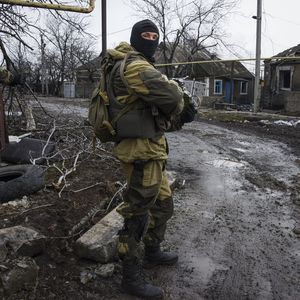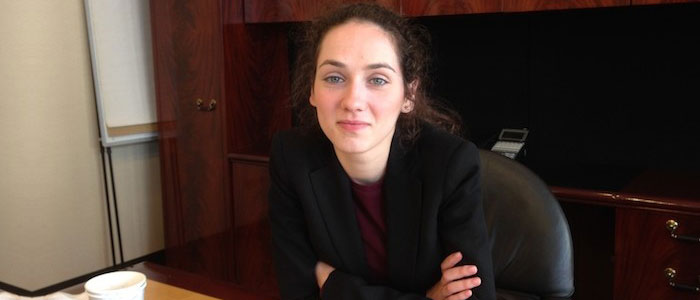Jewish Activism is Alive in Ukraine
By Vivian Henoch, Editor myJewishDetroit
May 1, 2015
When the daily shelling began to be too much to bear last June, 23-year-old Masha Shumatskaya packed up her belongings and left her hometown of Donetsk in eastern Ukraine for the safety of the larger city of Kharkov, located in the north-east of the country.
Since then, she’s become one of 2,500 internally displaced Jews aided by JDC after they fled fierce fighting between government and separatist forces. Today, JDC also continues to serve thousands of needy Jews in the separatist-controlled regions as well.
In response, JDC has deployed emergency services assisting Jews caught up in the conflict including: extra food, medicine and medical care; crisis-related home repairs; extra winter items such as warm bedding, clothing, utility stipends and space heaters; and a full aid package, emergency housing and post-trauma care for displaced Jews – including Masha.

When Masha arrived in Kharkov, she contacted the Hesed welfare center and began phoning elderly Jews who were stranded in Donetsk and the war-torn city of Lugansk to assess their needs during the ongoing conflict. Since then, she has initiated a special project in Kharkov – a replication of one she started in Donetsk – through which she has raised money and recruited volunteers to take food baskets and small gifts to seniors on the eve of Jewish holidays.
To raise awareness to the situation in Ukraine, JDC recently invited Masha on a two-week speaking tour of North America to address Jewish audiences in Vancouver, Seattle, Los Angeles, Philadelphia and New York.
Additionally, Masha sat down with Gil Shefler at JDC headquarters in New York City for a Q&A elaborating on her Jewish identity, hopes and fears for the future, and the current situation in Ukraine.
Can you tell us a bit about your Jewish background?
My ancestors were rabbis, but my grandparents weren’t connected at all. It was also impossible to identify as Jews during Soviet times. Nonetheless, others around them never let them forget their Jewishness. My mother put me in the Number 99 Jewish School in Donetsk because it was convenient, had a school bus, free breakfast and lunch and great teachers. There, I received a Jewish education, learned subjects in Hebrew and got really involved in Jewish life – I even took part in the International Bible Contest in Israel representing Ukraine and I still keep kosher.
How did you become involved with JDC?
When I was 17, there was an annual program for young leaders from all over Ukraine, organized by JDC, called Metsuda. They said it might be a good fit for me, and they were right. I learned the value of teamwork and met some of my best friends there. Perhaps the best thing was the network of mentors and colleagues that I gained. We still gather about once a year and discuss ways we can help out our communities. Some even have successful businesses – despite the crisis – and can give back.
What was it like living in Donetsk during the conflict?
It started with demonstrations by unarmed people. When they took over the government building, it didn’t seem unordinary or revolutionary. I saw that and told my boyfriend, “Maybe that’s what democracy is about.” He said, “This is a bad thing.” I only realized how severe the situation was when the barricades went up and some people started wearing masks and carrying guns. By the end of May, they started shelling the airport and we had to leave. We lost our jobs and there was no reason for us to stay. We thought we would be back by September – nobody thought it would be more than a few months – so we moved to Kharkov. We stayed with friends until eventually we found an apartment.
How were you received on your tour of North America?
It was great because I came to people who realized I was a war refugee, but didn’t realize the size of the catastrophe. I was treated as a member of the family and showered with love. They were grateful I came, and I thanked those I met, those who supported us and my mother. Thanks to their donations to JDC, we received food packages and financial help to rent our apartment for a few months. It was an honor to be an ambassador for all the Jews in need in Ukraine.
What does the future hold for you?
I have no idea – it depends on so many things. The thing that worries me the most is whether the war will come to Kharkov or not. If it does, I’ll be displaced a second time – not something I’d like to happen. In that case, I might have to think of other countries to live in. It might be Israel, or it might be another where I can find work as an English teacher or another specialist job. I had a lot of plans a year ago. Because of what happened, they changed completely.
Ukraine Update
Commenting on the crisis in Ukraine, JDC President Penny Blumenstein writes:
Masha is just one of more than a million internally displaced persons (IDPs) who have escaped eastern Ukraine, according to the Office of the United National High Commissioner on Refugees. Today, they are being cared for by a variety of government agencies and humanitarian bodies – including the American Jewish Joint Distribution Committee (JDC) – in major urban centers like Kiev, Dnepropetrovsk, Kharkov and Odessa.
Top of mind for the displaced – often unemployed and suffering post-traumatic stress – is getting the food, medicine, shelter and employment they need to survive in cities where they often have no friends or family connections. Additionally, they face suspicion and hostility from locals, especially among potential employers or property owners who openly discriminate against them for an assumed allegiance to the separatist cause.
On the separatist-controlled side of the tenuous ceasefire line, joblessness, spiking prices for scarce supplies, widespread destruction of property and safety concerns are taking their toll, especially on the most vulnerable. As an example, UNICEF just reported that 1.7 million children have been impacted by the crisis and, in the last year, at least 109 have been wounded and 42 killed by land mines and other devices in eastern Ukraine. Additionally, the elderly, who are homebound and suffer illness at high rates, are not receiving the paltry state pensions needed to purchase the most meager basic goods.

In a new development, working families who enjoyed economic gains before the conflict are facing despair, unable to keep up with work loss, plummeting local currency and the impact of a 10 percent drop in industrial output, a backbone of Ukraine’s economy. Of the more than 2,700 new people who have been added to our aid rolls, half are from families like these, turning to us for help for the first time.
But even in this bleak environment, much can be done to alleviate the suffering. For Jewish communities around the country, this has meant providing emergency aid to thousands of Jews who are displaced or who remain in the separatist regions. Together with a broad coalition of Ukrainian Jews, Jewish and Christian aid groups, advocates and activists – including the Jewish Detroit community through the Jewish Federations of North America – the JDC has deployed a massive and comprehensive package of assistance over the last year. To learn more and support the effort, visit the JFNA or the JDC.
About the JOINT
The American Jewish Joint Distribution Committee (JDC) – or commonly called the “Joint,” is the world’s leading Jewish humanitarian assistance organization. JDC works in more than 70 countries and in Israel to alleviate hunger and hardship, rescue Jews in danger, create lasting connections to Jewish life, and provide immediate relief and long-term development support for victims of natural and man-made disasters.
Feature photo credit: JTA/Uriel Heilman
Posted May 2015




